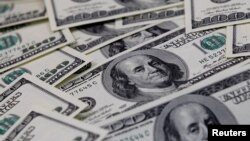Britain’s Foreign Secretary Dominic Raab has announced new United Kingdom sanctions against five individuals, including a top Zimbabwean businessman, said to be involved in serious corruption in Equatorial Guinea, Zimbabwe, Venezuela and Iraq.
In a message posted on the department’s official website, Rabb said the U.K has imposed sanctions on Kudakwashe Regimond Tagwirei “for profiting from misappropriation of property when his company, Sakunda Holdings, redeemed Government of Zimbabwe Treasury Bills at up to ten times their official value. His actions accelerated the deflation of Zimbabwe’s currency, increasing the price of essentials, such as food, for Zimbabwean citizens.”
Tagwirei was unavailable for comment as he was not responding to calls on his mobile phone. A USA investigative group recently released a report showing that Zimbabwean businessman, Kudakwashe Tagwirei, is allegedly using complex corporate structures and seemingly preferential government treatment to build his business empire and enormous wealth.
In the report published Friday titled “Shadows and Shell Games: Uncovering an Offshore Business Empire in Zimbabwe”, The Sentry reveals key details of Tagwirei’s business dealings, which have been linked to alleged corrupt activities.
The Sentry’s investigation reveals that Tagwirei, who is a presidential advisor, now presides over a sprawling network of more than 40 companies spanning the oil, mining, banking, logistics, transportation, and import/export sectors. The report details how Tagwirei has effectively concealed his control over this empire through an elaborate foreign network, hiding his wealth and ownership through offshore financial structures.
In a statement, The Sentry quoted Justyna Gudzowska, Director of Illicit Finance Policy at The Sentry, as saying: “This report presents a textbook case of just how far shady businessmen will go to evade financial institutions' due diligence requirements - utilizing complex ownership structures, nominee directorships, Cayman Islands investment funds, and trusts. Global banks cannot assume that they are safe from such manipulations just because they have a limited footprint in Zimbabwe. Enablers can be located in any jurisdiction, and financial institutions should be on continuous alert for possible money laundering and suspicious activity.”
Raab said the action the U.K has taken targets individuals who have lined their own pockets at the expense of their citizens.
“The UK is committed to fighting the blight of corruption and holding those responsible for its corrosive effect to account. Corruption drains the wealth of poorer nations, keeps their people trapped in poverty and poisons the well of democracy. These measures follow the first tranche of UK sanctions under the Global Anti-Corruption sanctions regime in April, which targeted 22 individuals involved in serious corruption cases in Russia, South Africa, South Sudan and Latin America. Over 2% of global GDP is lost to corruption every single year. Today’s action demonstrates the UK’s ongoing commitment to the fight against corruption.”
Since the Foreign Secretary launched the Global Anti-Corruption sanctions regime in April, in total the UK has now sanctioned 27 individuals around the world involved in serious corruption.
The targeted sanctions have also been imposed on four other people with one of those designated who “spent millions of misappropriated funds on mansions, private jets and a $275,000 glove that Michael Jackson wore on his ‘Bad’ tour, another ruthlessly exploited public food programmes in Venezuela.”
He said the UK would impose asset freezes and travel bans against these individuals to ensure they can no longer be able to channel their money through UK banks or enter the country.
The other person is Teodoro Obiang Mangue, Vice President of Equatorial Guinea, and son of the current President, who is cited for his involvement in the “misappropriation of state funds into his own personal bank accounts, corrupt contracting arrangements and soliciting bribes, to fund a lavish lifestyle inconsistent with his official salary as a government minister. This included the purchase of a $100m mansion in Paris and a $38 million private jet.”
These restrictive measures have also been imposed on Alex Nain Saab Morán and Alvaro Enrique Pulido Vargas for exploiting two of Venezuela’s public programmes, which were set up to supply poor Venezuelans with affordable foodstuffs and housing.
“They benefitted from improperly awarded contracts, where promised goods were delivered at highly inflated prices. Their actions caused further suffering to already poverty stricken Venezuelans, for their own private enrichment.”
Nawfal Hammadi Al-Sultan has also been slapped with the targeted sanctions for his involvement in serious corruption in his role as Governor of Nineveh province, Iraq, where he “misappropriated public funds intended for reconstruction efforts and to provide support for civilians, and improperly awarded contracts and other state property. Al-Sultan is currently serving a combined five-year prison sentence in Iraq for corruption offences, including wasting five billion Iraqi dinars (approximately £2.5 million) through fictitious public works.”
The financial restrictions will also apply to any entities owned or controlled by the persons designated on Thursday.




